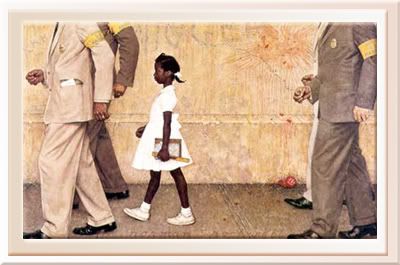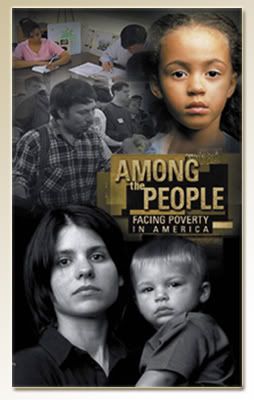
copyright © 2007 Betsy L. Angert. BeThink.org
Sit down my child and you shall hear the tale I tell of what was once revered. I know you are sleepy and need your rest. Perhaps, this parable will be the best anecdote for a body too busy to slumber. Close your eyes and count the sheep, as I whisper words that might make you weep. The fable is horrific, as most fantasies are. Nonetheless, my hope is the narrative will bestow great wisdom. When we contemplate the harsh realities of life we learn lessons. There are principles to digest, my darling. Too few discover; too many forget.

Once upon a time, on the morning of October 4, 2007, The New York Times reported, the United States government endorsed the use of severe and cruel methods during interrogation. The decision was delivered in secret.
Two years earlier Americans were told the Justice Department forbade such measures. Yet, in truth they never had. This, dear one, is characteristic in a White house gone wild with power. In this our surreal Orwellian world, to torment is to be compassionate. To crush the body and spirit of a living soul is apparently considered conservative, neoconservative.
Americans in the year 2007 are as Alice in Wonderland. We observe ourselves in the looking glass, and we wonder. Is up, down; is the mission accomplished, or is this a protracted exercise extended indefinitely into the future. My child I sense you are confused and disheartened. So too am I. Take heed. In time, sleep will come. Dreams will fill your head. My hope is you will forget all the misery I speak of, just as others have done so many times before you.
I remind you of what we each experience daily. In recent years, the public has become dubious. Most suspect the current Bush Administration, our nation’s leaders, falsify, tells half-truths, conceal, claim confidentiality, fabricate, or flounder. Nonetheless, citizens remain complacent. This recent October surprise is not treated as a revelation. It does nothing to excite or incite us into authentic action. As citizens, we do as we have done before, as you too shall do soon. We sleep. We utter barely a peep.
Granted, residents of the United States rant from the comfort of their over-stuffed chairs. Countrymen complain as they, we choke on the fumes from our grand gas-guzzlers. Yet, we drive. Millions of people fly inter and intrastate. Many travel abroad, just for fun, business too. Americans continue to pollute the skies. We resent the war for oil, the profits made on such a repugnant endeavor.
Citizens carp as we contemplate the cost of combat. The people are aware, that money could have been spent at home. The nation mourns the loss of life, American deaths and at times, the passing of an Iraqi. In cyberspace, communities clamor through their keyboards. Then we rest on our laurels.
Progressives say they elected a Democratic Congress. Certainly, that would make a difference. The 110th Congress, with Democrats in control, claim the first one hundred days a success. Yet, the war marches on.
For soldiers in Iraq and Afghanistan, time stands still. Families and friends hold their breath, fearful fathers, mothers, sons, and daughter will never return home. Those that have returned to native shores are not the same. Although, ‘enemy forces’ have not captured the American soldiers that found their way back to the States, the troops have been tortured.
Soldiers dressed in camouflage have stayed away too long. Each day American men and women awake in a land far from their native shore. Enlistees that once believed they had purpose; they could bring freedom to Iraqi have seen the cost of liberty is not cheap. The price is far greater than these young persons ever expected to pay. Children, barely out of high school have seen blood and the guts of their friends splattered on their shoes.
War on the streets of Baghdad is nothing like the battles on a video screen. Death, in the name of democracy, or G-d is not as holy as our leaders would want us to believe. American troops have witnessed an effective insurgency, one beyond imagination. Rebels that feel they have a cause are never as groomed in warfare as a trained soldier may be. Speaking on the resourcefulness of Iraqi revolutionaries Sergeant Benjamin Flanders, Army National Guard states . . .
It was very effective, and the thing they have us beat at is the human intelligence side. Maybe you can speak more to this, but they can use cruel and unusual methods in order to extract information from people that we couldn’t use. There is sort of this, like, torture — that word is getting thrown around — well, the true torture is when you behead innocent civilians and throw them on the side of the road, which we came upon more than once. That’s how they get their message across.
Torture is the topic of the day. It was in 2005. It has been the source of much discussion for years, ever since this strange, fantastic, dreamlike drama began. You my dear sweetness might recall, we read fables together so long ago. By candlelight, on another quiet evening, we gazed upon the pages and pondered.
I tucked those texts away. There they sit safe on the bookshelf. I sensed when we read these memorandums together they were too severe, too shocking; they upset you so. My darling the words on those pages, the images they evoked were too much for me. In truth, I was emotionally paralyzed by the verbiage. What I envisioned weighed on my heart. What have we wrought. The havoc, the harm, one human might do to another. It is unthinkable. Perhaps, one day we will wish to review the references again. For now, may they just remain close at hand.
Ah, but that was so long ago my adorable beloved. We studied that ghastly folio when you were but a baby in my arms. We cooed. We cuddled. In those, medieval days, the Dark ages, you and I were certain man would never be so cruel. Thus, we drifted off to dreamland and trusted. We had faith in our fair leader as we must today for the President, and his Cabinet, remain steadfast. “We do not torture.” The words ring out and have for what must be eons, no matter the evidence to the contrary. Indeed, since the latest exposure the frequency of this rhetoric has increased. The volume is vociferous.
Only days ago, George W. Bush proclaimed, America does not persecute, cause undue harm, harass, or forcefully torment those in custody. The President postured, the United States does not torture. Our government captures, confines, holds enemy combatants in custody, and castigates forcibly in order to safeguard Americans from harm.
Bush Says US ‘Does Not Torture’
By Jennifer LovenWashington (AP) — President Bush defended his administration’s methods of detaining and questioning terrorism suspects on Friday, saying both are successful and lawful.
“When we find somebody who may have information regarding a potential attack on America, you bet we’re going to detain them, and you bet we’re going to question them,” he said during a hastily called Oval Office appearance. “The American people expect us to find out information, actionable intelligence so we can help protect them. That’s our job.”
Bush volunteered his thoughts on a report on two secret 2005 memos that authorized extreme interrogation tactics against terror suspects. “This government does not torture people,” the president said.
The adorable Press Secretary, Dana Perino substantiates the declaration. Defiantly, this wily and wondrous woman mesmerized the media as she denounced the conclusion, Americans torture. Secret decrees aside, we would never do anything that was not in the best interest of the people. United States Intelligence does as is necessary. Their mission is as the President’s and the Justice Department’s, to protect and defend the nation.
In this new war, which is an unprecedented war, facing an enemy unlike we’ve ever faced before, sometimes — oftentimes the best information that you get is from the terrorists themselves. They know where the other terrorists are hiding and what the other terrorists are planning. And to win the war on terror we must be able to detain them, interrogate them, question them, and when appropriate, prosecute them — in America — when we capture them here in America and on battlefields around the world. The policy of the United States is not to torture. The President has not authorized it, he will not authorize it.
But he had done everything within the corners of the law to make sure that we prevent another attack on this country, which is what we have done in this administration. I am not going to comment on any specific alleged techniques. It is not appropriate for me to do so. And to do so would provide the enemy with more information for how to train against these techniques. And so I am going to decline to comment on those, but I will reiterate to you once again that we do not torture. We want to make sure that we keep this country safe.
“Safety” is the sanctuary that gives credence to what occurs in those corners of the law. It is for security sake that we retain the President, our protector. This magnificent man has decided to spread democracy aggressively, and we the people follow his lead, no matter where it takes us. George W. Bush is the law. He is the Commander-In-Chief. If this compassionate conservative thinks the mission is worthwhile, apt, or accomplished, who are we to argue.
Soldiers may see the war effort differently. However, if they do not understand the purpose and the profound contribution they make to the greater good of our society then they must be “phony soldiers.” In a News Hour interview that aired just two years ago, we can sense the inner struggle a service man or woman might feel. Patrick Resta, a former combat medic was among those that spoke. Specialist Resta shared his thoughts.
Margaret Warner:: All right, let me get Patrick Resta in here. And Patrick Resta, you were a combat medic with the Army National Guard. How did all of this look from your end in terms of the U.S. troops’ tactics and, for that matter, equipment? Did it appear to you that the U.S. approach was making progress?
Specialist Patrick Resta: No, it didn’t. I was told I was going there to help the Iraqi people. And then once I got there, I found out that I could not treat them unless they were about to die and the injury had been caused either directly or indirectly by U.S. forces, such as an IED going off or a car bomb going off or somebody being shot at a checkpoint, or something like that. So I don’t think that’s really conducive to getting people on your side.
There was one night in particular where a local Iraqi walked to the gate of our camp after he had been beaten up pretty severely and pistol-whipped, and basically the people in town told him that if he came back to town they would kill him if they saw him in town again. And he came up to our gate begging for help. I went out there, you know, to dress his wounds and take care of him.
And he was begging me to save his life and he was just, you know, turned away and told, you know, “Go to the Iraqi police and they’ll help you,” which, you know, it’s after nightfall and the police aren’t functioning, especially not in my area. So it was that kind of callous disregard that really set in what’s really going on over there for me.
Oh sweetness, I know this tale is hard to take. I see you are troubled. Breathe deeply my love. Take heart. Americans raged. They released the anger they felt. However, ultimately, they accepted. There was not time then; nor are there sufficient days now to impeach this President or his Cabinet. Congress cannot act. Such measures might detract from the broader coalitions purpose, to get elected in 2008.
I understand dear heart. There is much frustration. Sleep tight. This too shall pass. Signing statements, secret judgments that allow for torture, substantiation, Bush Began to Plan War Three Months After 9/11, nothing seems to prompt the people to act. Perchance they too are tired. Rest your head on my shoulder love. Soon, it will all be over.
Yes, yes, the Administration misled the public; citizens recognize this. However, no matter the depth of deception, most Americans choose to relent. Our countrymen believe they can do nothing to stop what this White House does. If a former Prisoner of War, one that avidly supports the war effort, cannot help this Administration see the light, what can a lowly citizen Progressive do. Possibly, those on the Right that now reject the need for this battle are too embarrassed to express what they also observe. The Emperor has no clothes. Nor do we, the jesters.
My child, the words of Senator John McCain were strong. He spoke from experience. McCain challenged conventional wisdom and the Commander-In-Chief. Yet, his profound assessment fell on deaf ears. You recollect.
Obviously, to defeat our enemies we need intelligence, but intelligence that is reliable. We should not torture or treat inhumanely terrorists we have captured. The abuse of prisoners harms, not helps, our war effort. In my experience, abuse of prisoners often produces bad intelligence because under torture a person will say anything he thinks his captors want to hear–whether it is true or false–if he believes it will relieve his suffering.
There was a glimmer of anticipation, as improbable as it was. Publicly Progressive rejoiced. Even the hardened delighted. A legal decision was handed down in December 2004. The Justice Department publicly proclaimed the deliberate infliction of severe physical pain is “abhorrent.” Politically astute, no matter the Party, citizens truly welcomed this judgment. Yet, we knew. The most informed among our countrymen were well aware that as day turned to night, we could not deny, nothing was different. Nor would it be in this nightmare of a novel.
Friend and foe alike were subject to torture. George W. Bush and the neoconservatives were and are on a mission. While they say it was accomplished, they also acknowledge without a win, we, the Americans will not leave the land we have destroyed. A legacy is at stake.
Americans hold onto hope. The President is expected to leave office in January 2009, G-d willing. Thus, the people of this country are encouraged.
My sweet child, the electorate must purposely delude themselves. Whimsy is the only action that might allow them to remain sane. People do not wish to think of the pain they, the American people inflict on soldiers, innocent Iraqi civilians, women, and children at home and abroad. Civilians prefer to ponder change will come when Bush exits the White House. Thus, the people wait patiently. They can, for Americans sleep well in their cozy beds.
Fluff the pillows. Snuggle up in the comforter. Bring another blanket into the room. It is chilly out there. Perhaps it is colder in our hearts.
When the Iraqi government felt a need to recess, for the temperature was one hundred and twenty degrees plus, Americans were angry. Plump people seated in air-conditioned rooms expressed their disdain for those that struggle to work in a war torn country with little to no electricity.
Understandably, Americans are distracted. They are excited. An election is on the horizon. A large percentage of the population longs for the 2008 appointment of a President. Each state can hardly wait to participate. The Primaries cannot come soon enough. From Florida to California, every region wishes to be the first to pick the “winner.” With a sigh I state, I believe we are all losers. I wonder how we sleep. I can only muse.
The peaceful among us, those that honor humanity, and the rules of Geneva Convention chose to forget what they, we, wish were not true. Oh, they protested with vigor; however, ultimately, they had jobs to consider, bills to pay, a family to support. Their strength was quelled by the demands of life. Assertive pacifists understood as they have throughout the President’s term, this White House deliberately and delicately defines the term “torture.” In America, the Bush Bunch is the medium and the message.
The White House and the Justice department were kind enough to hide the truth for a time. Cognitive dissonance can be so wonderful; it allows for necessary rest. Peaceniks needed time to feel settled, to sense that they made a difference. The stress was too much for the non-combative. They, my dear were losing sleep. That would not do. In a Capitalist society, the everyday chump must be fit, fresh, and ready to take on the most routine of days.
In times of war, production is important. There are profits to consider. Ah, my child. Do not fret. Perhaps, this tale too is but a dream. Official opinions come and go. I know you heard as I did, the good President Bush Defend[ed] CIA’s Clandestine Prisons. He said, ‘We Do Not Torture.’ Well, perhaps we do, just a pinch. Nonetheless, it was good to stay in the dark. The light hurts my eyes. Does it not bother you my little love? What is it they say, “ignorance is bliss?” Ah, to be joyous again. However, the real news invades our space once more.
The Justice Department issued another opinion, this one in secret. It was a very different document, according to officials briefed on it, an expansive endorsement of the harshest interrogation techniques ever used by the Central Intelligence Agency.
The new opinion, the officials said, for the first time provided explicit authorization to barrage terror suspects with a combination of painful physical and psychological tactics, including head-slapping, simulated drowning and frigid temperatures.
Mr. Gonzales approved the legal memorandum on “combined effects” over the objections of James B. Comey, the deputy attorney general, who was leaving his job after bruising clashes with the White House. Disagreeing with what he viewed as the opinion’s overreaching legal reasoning, Mr. Comey told colleagues at the department that they would all be “ashamed” when the world eventually learned of it.
Later that year, as Congress moved toward outlawing “cruel, inhuman and degrading” treatment, the Justice Department issued another secret opinion, one most lawmakers did not know existed, current and former officials said. The Justice Department document declared that none of the C.I.A. interrogation methods violated that standard.
The classified opinions, never previously disclosed, are a hidden legacy of President Bush’s second term and Mr. Gonzales’s tenure at the Justice Department, where he moved quickly to align it with the White House after a 2004 rebellion by staff lawyers that had thrown policies on surveillance and detention into turmoil.
Congress and the Supreme Court have intervened repeatedly in the last two years to impose limits on interrogations, and the administration has responded as a policy matter by dropping the most extreme techniques. But the 2005 Justice Department opinions remain in effect, and their legal conclusions have been confirmed by several more recent memorandums, officials said. They show how the White House has succeeded in preserving the broadest possible legal latitude for harsh tactics.
Progressives did not doubt that this truth would be exposed, eventually. Still, they do not act as they might. Perchance, they are too war weary to do what they no longer think possible. Too much time has passed. In late 2007, the public says there is no time to impeach this President or his Vice. Liberals listen to interviews. We mumble and crumble. We hear the words and yet, we sit still.
In defense of such an odious offense, Homeland Security Advisor, Fran Townsend speaks to the media. Journalist, Wolf Blitzer of The Situation Room inquires of the torment inflicted on a previous guest.
Blitzer: We’re joined by the White House homeland security adviser, Fran Townsend. She’s joining us from the White House.? ?You just heard this former inmate — this former detainee at Guantanamo Bay say I was beaten, shackled, spat at, kicked, punched, stripped naked, left in isolation sometimes naked, hog tied.??What do you say to that charge that he’s making?? ?In effect, experts say, that amounts torture.??
Fran Townsend, White House Homeland Security Advisor: OK. Well, let’s back up and be very clear. You’ve heard Dana Perino say it today. You heard the president say it numerous times — the United States does not torture.?? Do we have a program???
Yes, we do. It is — it is very limited. There have been fewer than 100 people in it. But it has pro — and the people who participate in that program are carefully trained, with more than 250 hours of training. The average age of an interrogator is 43. They’re not just interrogators who are part of the team. There are also subject matter experts and individuals who are there to monitor the health and psychological well-being of the detainee himself.??
We start with the har — the least harsh measures first. It stops after it — if someone becomes cooperative.? ?And let’s be clear, Wolf, this — this is a — this is a program that was used when Abu Zubaydah was in custody and not being cooperative. He had clearly been trained in resistance techniques to interrogation. This — this — and these techniques…??
Blitzer: All right, well, let’s go through…??
Townsend: Well, wait a minute, Wolf.??
Blitzer: Yes.??
Townsend: These techniques were used on Abu Zubaydah. It produced actionable intelligence that resulted in the capture of Ramzi Binalshibh. This is — this — these programs stop attacks.??
Blitzer: All right, well, let’s go through some of the specifics and you tell us if you’re doing that.??For example, the “New York Times” says these memos authorized not only slaps to the head, but hours held naked in a frigid cell, days and nights without sleep while battered by thundering rock music, long periods manacled in stress positions or the ultimate — water boarding. “Never in history,” the “Times” says, “has the United States authorized such tactics.” ?Is that true???
Townsend: Now, Wolf, obviously I’m not going to talk about each individual and specific technique that we used. The director of Central Intelligence has talked to members of both Intelligence Committees in the House and the Senate. He — what he did was he understood this was not just a legal question, but there was a policy issue and there’s a political willingness question.??
Frankly, Wolf, if Americans are killed because we fail to do the hard things, the American people would have the absolute right to ask us why.
We inquire, then, we wait. Americas do not move en masse to the streets of Washington, New York, Los Angeles, or Des Moines. Small town USA remains quiet. While boulevards are bustling, the sounds are not of crowds up in arms. What we hear is commerce in action.
Congress may be in session; however, they continue to be disconnected. Americans, distrustful and with reason, do not telephone House Leader Nancy Pelosi and state, “Impeachment must be on the table.” Those proud to be labeled rebels excitedly await the 2008 election. Most are so overjoyed by the prospect that they might throw the Bushies out.
I know my love, ’tis true, as the Democrats dance and dicker, people in foreign lands fight for their lives. Again, the ability to hold two distinct beliefs simultaneously is quite the art. It calms the soul and lives large amongst all of us. Many think one of the three lovelies is their only hope.
If George W. Bush is the sinister character in this drama, Hillary Rodham Clinton, Barack Obama, and John Edwards are the dynamic duo or trio. Surely, one of these three will save the day. Hillary is high in the polls. She is strong, savvy, and brings Bill with her. Obama supporters purport he is the one. This man has style. Barack is smooth, article. People gravitate to him as they would a rock-star. Edwards is as a prince to those enamored with his casual charismatic manner, his broad grin, and his profound gaze. He has charm, chutzpah; and a wife that won the hearts of a nation.
People throughout the nation presume to believe they can pick a winner and will before the November 2008 general election. Thus, impatient Americans gather together to support the sole candidate that they trust to prevail, regardless of the fact that the war will not end under her, or his leadership.
Dems can’t make guarantee on Iraq troops
By Beth Fouhy
Associated Press
Wed Sep 26, 9:26 PM ETThe three leading Democratic presidential hopefuls conceded Wednesday night they could not guarantee that all U.S. combat troops would be gone from Iraq by 2013.
“I think it’s hard to project four years from now,” said Sen. Barack Obama of Illinois in the opening moments of a campaign debate in the nation’s first primary state.
“It is very difficult to know what we’re going to be inheriting,” added Sen. Hillary Rodham Clinton of New York.
“I cannot make that commitment,” said former Sen. John Edwards of North Carolina.
Nonetheless, the public does not pause or blink. Presidential hopefuls pander in their attempts to explain what they truly meant, or at least some do. It matters not. When charmed, captivated, and determined to believe the Democrats must and will conquer the eyes glaze over. Ear cavities close. Brain cells become numb. People refuse to give up that dream; the troops will come home if a Democrat is in the Oval Office.
I suspect my love, those that truly yearn for peace long to sleep through the night. That is the only thought that might explain why people that profess peace happily embrace the notion of five more years of battle.
I have to trust numerous Americans tossed and turned too frequently in the dark of night since America attacked Afghanistan and then Iraq. I did. Perchance, some are so desperate for relief they say, anyone but Bush. I do believe war can wound the psyche, planet wide. When soldiers and civilians die, I have to believe sensitive souls feel the pain, consciously or not.
Perhaps, my beloved I am in error. I observe brutal battles among those that claim to be Progressive. In cyberspace, communities crumble under the weight of differences. Defiance in the name of self-defense thrives. On the street corners, I hear peace protesters scream with delight as they dodge and weave the barbs thrown at them. Often, those that march in the name of harmony aggress against those that support the wars.
Maybe sweet one, some genuinely catch a snooze. For a few, peace protests may be a crusade. Professed pacifists, some, also wish for victory. Possibly, they sleep when they sense blood in the water. Could it be, for such Democrats, Progressives, and Liberals a win at any costs is the mantra they embrace just as those on the Right do? I know not young one. I only wonder how those that think, triumph is strength, sleep. Perhaps the answer is obvious. Americans when distressed; find respite in drugs. A Pharmaceutical stupor might explain why we the people are willing to accept what we do.
War through 2013 is now wonderful, practical, and Presidential. Torture is not a high crime nor is it a misdemeanor. When without slumber, a prolonged war is peace. Poverty is prosperity. What was grim is welcome. Yes, my dearest, Americans have been down so long it is beginning to look like up and we have been up too long.
Oh precious one, I know this tale is distressing. The trauma, the drama, the dreadful torture, and the time, it all slips away as we watch and wait for more what, Godot. We heard the President, his Press Secretary, and the homeland Security Adviser, Fran Townsend say “America does not torture.” We are not reassured. Americans may ask, “How do they sleep at night?” The answer must be as the question, “How do we!”
I wish you pleasant dreams little one. Say your prayers. “Now I lie me down to sleep. Pray the Lord my soul to keep, for if one more person dies before I wake, if another individual is tortured as I slumber . . . Oh G-d, Allah, the Almighty, the greatest powers within the universe let the planet sleep. Please bring serenity and peace to us all.
Little love, I promise, tomorrow will be a better day. I will share the story of a Don Quixote Dennis Kucinich. The miracle man tilts at windmills. He imagines what others think the impossible dream. The Kucinich tale is inspirational. The narrative uplifts the soul. As the big business bullies battled with Dennis, decades ago, when they demanded he give up his principles and bow to them at the expense of the common people, dreamer Kucinich remained strong and resolute. This magnificent man did not allow the brutes to intimidate him. Muny Light remained the people’s utility.
Years later as a nation declared war. Dennis Kucinich spoke only of “Strength through peace.” This Presidential aspirant helps us believe in man’s humanity to his fellow man. My child, you will wake and all will be well. With Dennis Kucinich in your mind, heart, and in the Oval Office we can bring the troops home, cut the funds, and truly cast the President and Vice President aside. If only I had read the Kucinich legend to you long ago, perhaps we could have removed the scourge before they had done so much damage.
Perchance, with the wisdom I share when you awake, my dear heart, you too will feel empowered. Honey Bun, might the legend of Don Dennis Kucinich help encourage us all to impeach our present rulers, to be the change we imagine. The time left in their term is already too long. I cannot endure more tales of torture; can you?


The Tortuous Details. The Drama. The Trauma . . .






